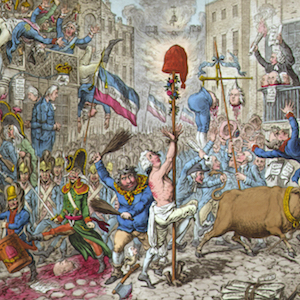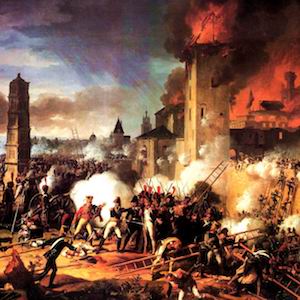War

Battle of Aboukir
Napoleon’s eventual acquisition of political power may be attributed partly to his success in publicizing his Egyptian campaign as a great victory for France that spread the values of the Revolution.

Battle of the Pyramids
After a six–week journey from France, the army of some 38,000 arrived in Egypt. The French stormed and took Alexandria first, then moved up the Nile toward Cairo.

Promised Horrors of the French Invasion
This highly sophisticated political cartoon by the noted engraver James Gillray from October 1796 responds to Edmund Burke’s pamphlet, "Reflections on a Regicide Peace." This image argues against further war with France to avoid bankrupting the British treasury and exposing England itself to inva

Battle For and Taking of Ratisbon, April 23, 1809
The general peace agreement lasted a scant two years after the treaty of 1801.

Sire, They Are My Sons and My Wife
Napoleon cultivated the intense personal loyalty of his troops with engravings like this one, which suggests a personal interest in the ordinary soldier.

Retreat from Russia
There was not much to celebrate in the Russian campaign, especially once the retreat from Moscow began. Print depicting the horrific conditions and loses suffered by the French army as it retreated from Moscow in the winter of 1812.

The Day after Waterloo
Thousands died or were wounded in the fighting that began 15 June and ended at a series of farmhouses at Waterloo on 18 June 1815.

Napoleon in Italy 1796-97
Map depicting Napoleon's campaigns in Italy, 1796-97.
This source is a part of the The Napoleonic Experience teaching module.

Napoleon’s Egyptian Campaign
Map depicting Napoleon's Egyptian campaigns.
This source is a part of the The Napoleonic Experience teaching module.

The Moscow Campaign 1812
Map depicting Napoleon's 1812 Russia campaign.
This source is a part of the The Napoleonic Experience teaching module.